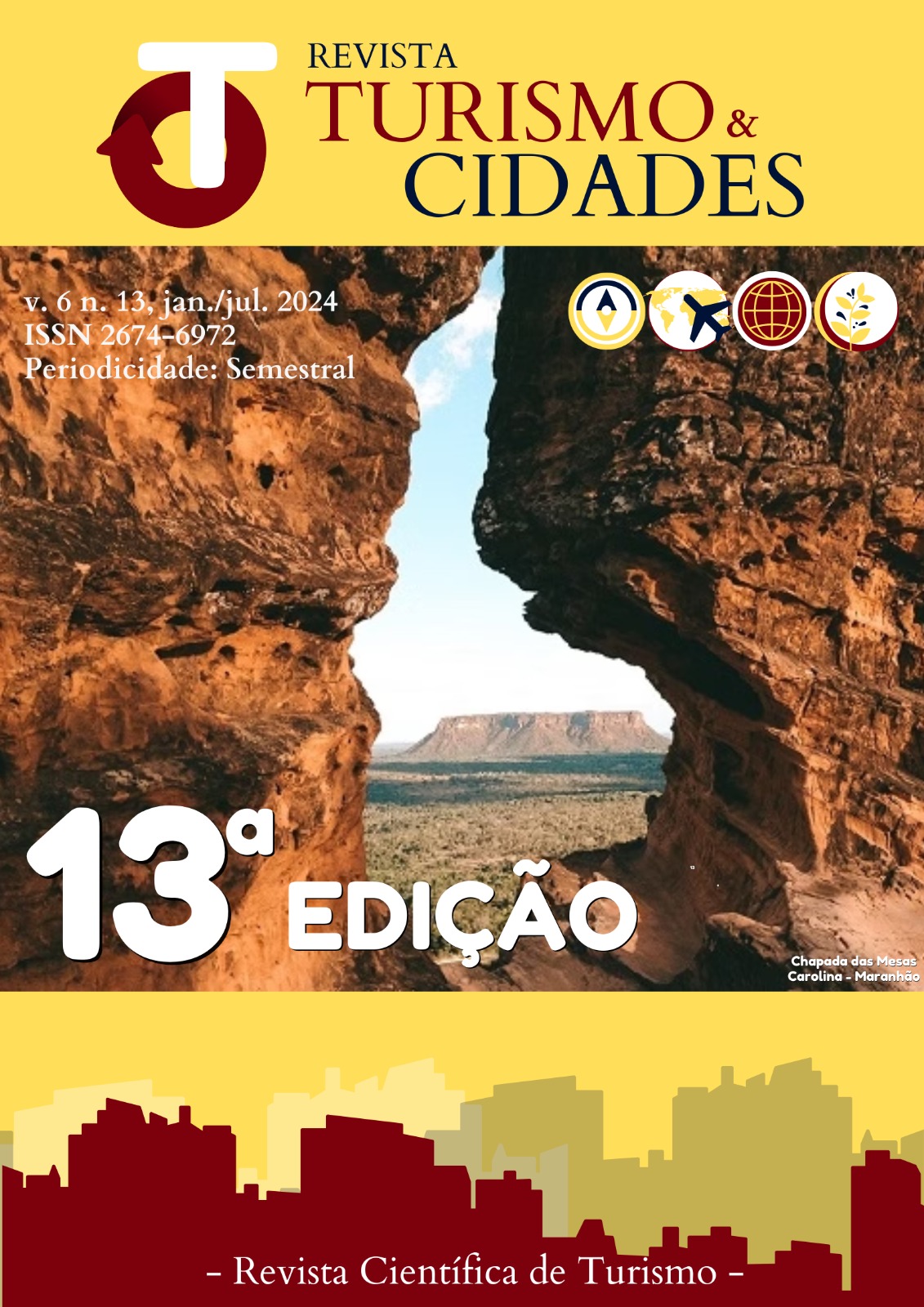Responsive Cities
Can this urban management model benefit the tourist experience?
DOI:
https://doi.org/10.18764/2674-6972v6n13.2024.2Keywords:
Cidades responsivas, Cidades inteligentes, Tecnologia, Destinos turísticos inteligentesAbstract
From the concept of smart cities, smart tourist destinations emerged, which brought changes in tourist activity, both on the part of consumers and the locality. Thus, responsive cities emerge, bringing a new form of management, with greater participation from residents, facilitated by technological innovations. The question then arises: How could responsive cities contribute to improving the experience of visitors? To this end, we intend to
evaluate the emergence of the debate on responsive cities in the existing literature and identify the objectives of the studies. As a methodology, a bibliographic review of the main concepts and a systematic review of the literature were carried out in two important databases to evaluate the quantity and quality of publications. As a result, few publications were found on responsive cities and even fewer on them and technologies in tourism. There was a research gap in studies that analyze responsive management and the increase in useful information for better planning of tourist activities in these locations.
Downloads
References
AZEVEDO, E. A; BARROS NETO, J. J. S. Os novos cenários turísticos: inovação, planejamento e as megatendências. Revista A Barriguda, Campina Grande. v. 7, n. 2, p. 220-239, 2017.
BARBOSA, D. P.; MEDAGLIA, J. Tecnologia digital, turismo e os hábitos de consumo dos viajantes contemporâneos. Marketing & Tourism Review, v. 4, n. 2, p. 1-33, 2019.
BARDIN, L. Análise de Conteúdo. São Paulo: Edições 70, 2011.
BARNS, S.. Responsive Listening: Negotiating Cities of Sirens, Smartphones and Sensors. Sound, Media, Ecology, p. 217-231, 2019.
BRASIL. Instituto Butantan. Qual a diferença entre SARS-CoV-2 e Covid-19? Prevalência e incidência são a mesma coisa? E mortalidade e letalidade?. Brasília: Instituto Butantan. [s.d]. 2024. Disponível em: https://butantan.gov.br/covid/butantan-tira-duvida/tira-duvida-noticias/qual-a-diferenca-entre-sars-cov-2-e-covid-19-prevalencia-e-incidencia-sao-a-mesma-coisa-e-mortalidade-e-letalidade. Acesso em: junho de 2024.
BRASIL. Ministério do Meio Ambiente e Mudança do Clima. Brasília: Ministério do Meio Ambiente e Mudança do Clima. 2023. Disponível em: https://www.gov.br/mma/pt-br. Acesso em: Junho de 2023.
CARNEIRO, J.; ALLIS, T.. Como se move o turismo durante a pandemia da COVID-19?. Revista Brasileira de Pesquisa em Turismo, v. 15, p. 2212, 2021.
COSTA, A. B.; ZOLTOWSKI, A. P. C. Como escrever um artigo de revisão sistemática. In: KOLLER, S. H.; De PAULA COUTO, M. C. P.; HOHENDORFF, J. V. (Orgs.). Manual de Produção Científica. Porto Alegre: Penso, 2014, p. 53-67.
ENDEAVOR, 2023. Disponível em: https://endeavor.org.br/estrategia-e-gestao/crowdsourcing/. Acesso em: Junho de 2023.
FONSECA, L.; OBINO, L. Cidades Responsivas: utopia, ficção, ou uma nova realidade? Disponível em: https://revistaarea.com.br/cidades-responsivas-utopia-ficcao-ou-uma-nova-realidade/ Acesso em: junho de 2023.
GIL, A. C. Como elaborar projetos de pesquisa. São Paulo: Atlas, 2002.
GIL-GARCIA, J. R.; PURON-CID, G.; ZHANG, J. Conceptualizing smartness in government: an integrative and multi-dimensional view. Gov. Inf. Q. v. 33, n. 3, p. 524-534, 2016.
GOLDSMITH, S.; GARDNER, B. O Ciclo da Cidade Responsiva. Data Smart City Solutions, Outubro de 2022.
JAFARI, J.; RITCHIE, J. B. Toward a framework for tourism education: Problems and prospects. Annals of Tourism Research, v. 8, n. 1, p. 13-34, 1981.
HALL, C. M.; SCOTT, D.; GOSSLING, S. Pandemics, transformations and tourism: be careful what you wish for. Tourism Geographies, v. 22, n. 3, p. 577-598, 2020.
HEINEKE, K.; KAMPSHOFF, P.; MKRTCHYAN, A.; SHAO, E. Self-driving car technology: when will the robots hit the road? Mckinsey & company. 2017. Recuperado em 17 de maio de 2021 de: https://www.mckinsey.com/industries/automotive-and-assembly/our-insights/self-driving-car-technology-when-will-the-robots-hit-the-road. Acesso em: Junho de 2023.
KHATOUN, R.; ZEADALLY, S. Smart cities: concepts, architectures, research opportunities. Communications of the ACM, v. 59, n. 8, p. 46-57, 2016.
KYRIAZOPOULOU, C. Architectures and requirements for the development of smart cities: a literature study. In: Smart Cities, Green Technologies, and Intelligent Transport Systems. 2015, p. 75-103.
MCKENNA, H. P. Exploring the quantified experience: Finding spaces for people and their voices in smarter, more responsive cities. In: Proceedings of the Future Technologies Conference (FTC) 2018: Volume 1. Springer International Publishing, 2019. p. 269-282.
MUELLER, J.; LU, H.; CHIRKIN, A.; KLEIN, B.; SCHMITT, G. Citizen Design Science: A strategy for crowd-creative urban design. Cities, v. 72, p. 181-188, 2018.
NOUSSAIR, L.; JIHAD, Z.; HAJAR, M. Responsive Cities and Data Gathering: challenges and opportunities. Proceedings of the 3rd International Conference on Smart City Applications, p. 1-8, 2018.
PINE, B. J.; GILMORE, J. H. The Experience Economy: Work Is Theatre & Every Business a Stage. Harvard Business School Press, Boston, 1999.
SANTOS, S. R.; GÂNDARA, J. M. G.; LEITE, A. R. L.; DE SOUZA, A. G. Destino Turístico Inteligente e a Experiência Turística: caso de um destino patrimônio cultural da humanidade na região Nordeste do Brasil. Marketing & Tourism Review, v. 4, n. 2, 2019.
SEBRAE. Disponível em: https://www.sebrae.com.br/sites/PortalSebrae/artigos/como-aplicar-o-conceito-de-esg-na-sua-empresa . Acesso em: Abril de 2023.
SOARES, R.; PAES-CESÁRIO, M. F.; DE ARAÚJO, M. V. P. Destinos turísticos inteligentes e a experiência dos turistas: revisão sistemática da literatura em periódicos brasileiros. Rosa dos Ventos - Turismo e Hospitalidade, v. 14, n. 3, p. 726-746, 2022.
TONG, L.; YAN, W.; MANTA, O. Artificial intelligence influences intelligent automation in tourism: A mediating role of internet of things and environmental, social, and governance investment. Frontiers in Environmental Science, v. 10, p. 135, 2022.
UNWTO. Disponível em: https://www.unwto.org/. Acesso em: setembro de 2020.
XIANG, Z.; FESENMAIER, D., R. Big Data Analytics, Tourism Design and Smart Tourism. Analytics in smart tourism design: concepts and methods, p. 299-307, 2017.
ZHANG, J.; WALSH, J. Tourist Experience, Tourist Motivation and Destination Loyalty for Historic and Cultural Tourists. Pertanika Journal of Social Sciences and Humanities, v. 28, n. 4, p. 3277-3296, 2021.
Downloads
Published
How to Cite
Issue
Section
License

This work is licensed under a Creative Commons Attribution-NonCommercial-NoDerivatives 4.0 International License.

Esta obra está licenciada com uma Licença Creative Commons Atribuição-NãoComercial-SemDerivações 4.0 Internacional.
Autores mantém os direitos autorais e concedem à revista o direito de primeira publicação, sendo o trabalho simultaneamente licenciado sob a Creative Commons Attribution License o que permite o compartilhamento do trabalho com reconhecimento da autoria do trabalho e publicação inicial nesta revista.




